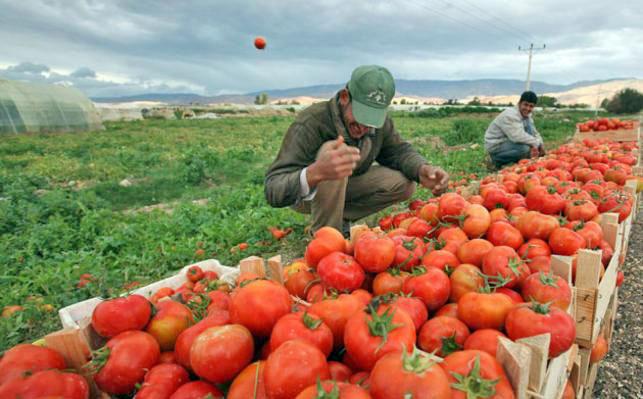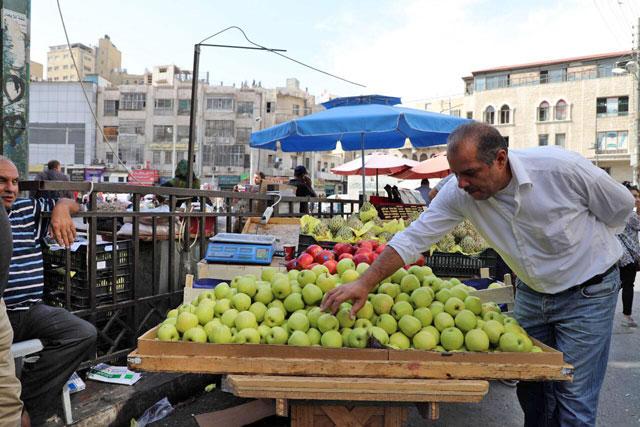You are here
Farmer woes persist despite border openings — union
By Maram Kayed - Jan 04,2020 - Last updated at Jan 04,2020

Alongside challenges in competing with cheap Syrian produce, Jordanian farmers still face a number of challenges in the local market, including production and transportation costs, according to the Jordan Valley Farmers Union (File photo)
AMMAN — Farmers facing serious challenges are “scared, rather than excited” for the new year, says the Jordan Valley Farmers Union.
In a phone interview with The Jordan Times, Union President Adnan Khaddam said that the opening of the Jabir-Nasib border crossing with Syria and the Karameh-Turabil border crossing with Iraq were “two great disappointments” for the sector in the past year.
While the sector expected the opening of the Jabir-Nasib crossing to facilitate exports routes not only to Syria but also to Eastern Europe and Russia, “reality unfolded differently”, according to Khaddam.
“As per the many agreements we signed with Syria, we imported tonnes of produce, specifically fruits. Syria, however, did not import so much as a kilo of our produce,” said the president.
In February of 2019, Saadi Abu Hammad, president of the Jordan Exporters and Producers Association for Fruit and Vegetables, told The Jordan Times that the border opening “has done more harm than good”.
“At least when the border [with Syria] was closed, we only had to deal with the problem of getting our exports to Europe. Now, not only do we still have that problem, but we also have to compete with extremely cheap Syrian produce, which is being sent to neighbouring countries through the Gulf,” he added.
Iranian farmers also target the Arabian Gulf; Jordan’s biggest export market, according to Khaddam.
“Iran can move their produce to Kuwait, the UAE, Saudi Arabia and Qatar in a matter of hours. So Jordanian farmers have cheap Syrian produce and the quick delivery time of Iranian produce to compete with. Our biggest market, the Gulf, is one that is very desirable,” added Khaddam.
The opening of the Karameh-Turabil crossing “did not prove helpful” to the sector either. The market, according to both Khaddam and Abu Hammad, is “still closed” to Jordanian farmers.
“Our agreements remained just that — words on paper,” Khaddam said. “There is no actual export activity, despite us having imported tonnes of garlic and onions from Iraq. Ironically, our exports actually declined in 2019 after the border opening from 2018, when the border was closed.”
In light of this situation, Minister of Agriculture Ibrahim Shahahdeh introduced the local produce protection policy, which has banned the export of 22 agricultural products.
“That was a good step for the sector, perhaps the only one. Now, at least locally, farmers do not have to compete with anyone else,” said Khaddam.
At the time that the decision was announced, Abu Hammad said “deciding to treat those who have stopped importing from us in the same manner is a win for the Jordanian farmer’s wallet and pride”.
However, farmers still face a number of challenges in the local market, according to Khaddam.
“Production and transportation costs are too high. Something has to be done about the cost of water, worker wages, taxation policies and transportation costs. Farmers are drowning in debt just to keep going,” he added.
Over 23,000 farmers were reported to be in debt and wanted by the law in 2019, the Jordan Valley Farmers Union announced in December.
In continuous negotiations with the Ministry of Labour, the agricultural sector has asked the ministry to scrap its ban on foreign workers, as it has caused wages to soar, according to Khaddam.
“We want local workers to benefit — of course we do. But the farmer simply cannot pay any more in wages than he already does. So the possible solution is one of two: Either the local worker accepts the same amount given to a foreign worker, or we import foreign workers again. The farmer paying more is not a solution to be considered in the least,” he concluded.
Related Articles
AMMAN — A bureau jointly owned by Iraq and Jordan will soon open to implement the new 50-50 truck loading policy, according to President of
AMMAN — Citing traces of “residual pesticides” and “local competition”, Syrian produce is now banned from entering Jordanian markets, the Mi
AMMAN — The first delegation representing Jordan’s producers, exporters and importers of agricultural produce is set to head to Damascus on
















